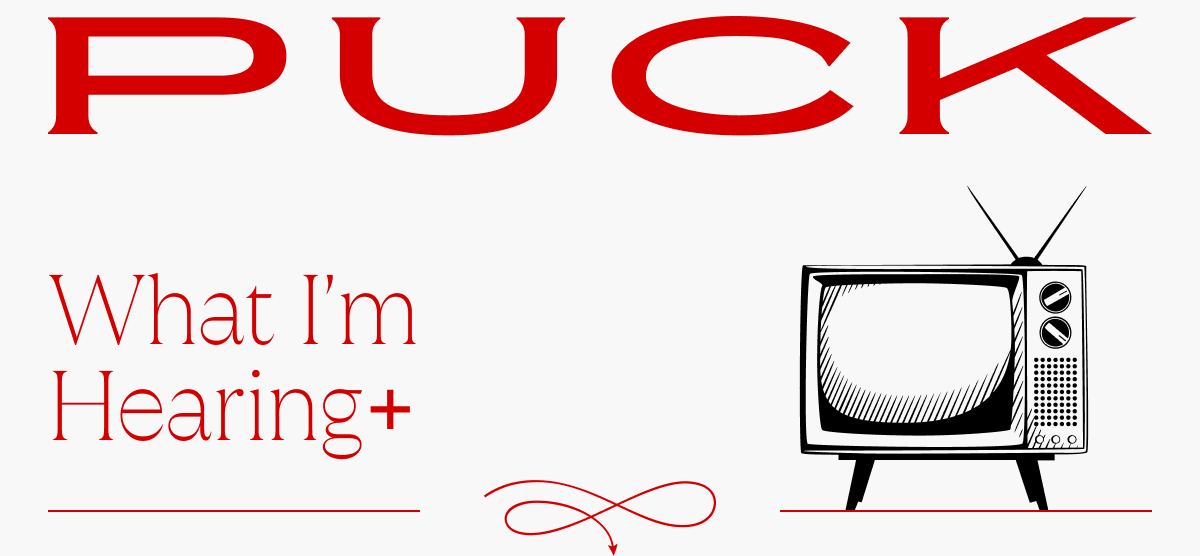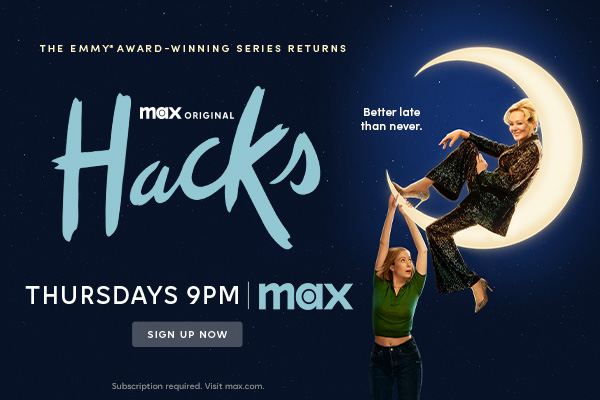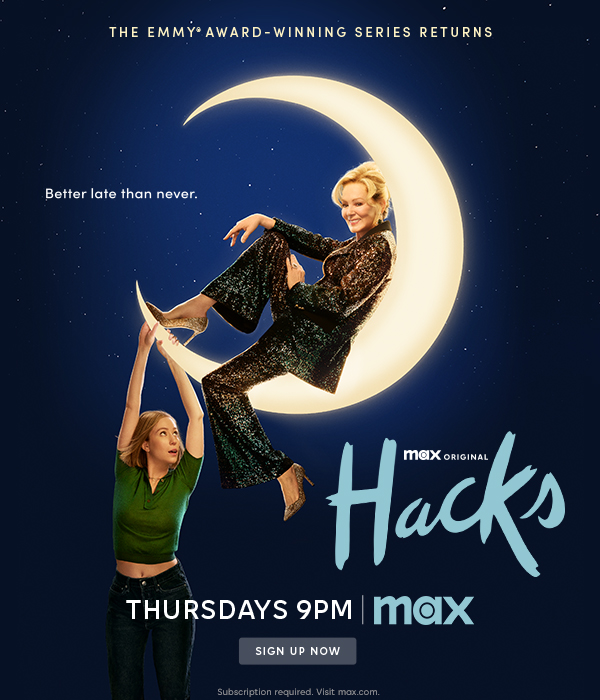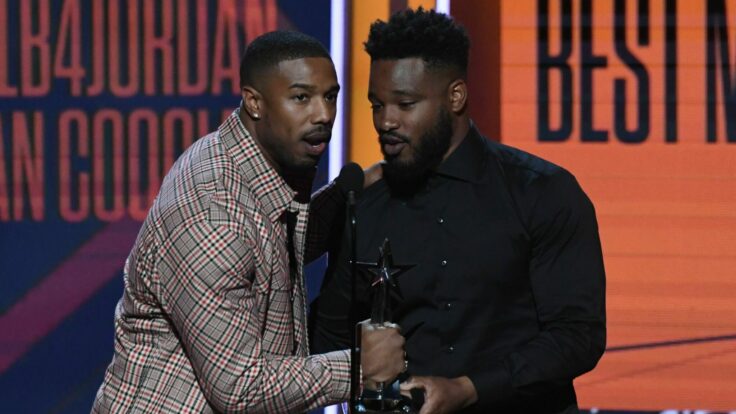Hello and welcome back to What I’m Hearing+, the green jacket of the WIH golf
tournament. Today, as I promised yesterday, Eriq Gardner is here with an analysis of the potentially billion-dollar ruling in the Sony-CBS fight over Jeopardy! and Wheel of Fortune, plus a rare consensus issue in Hollywood, and an Elon-friendly ruling in the dust-up over a dystopian Blade Runner–esque image. Go for it, Eriq…
But first…
|
|
|
A MESSAGE FROM OUR SPONSOR
|
The Emmy award-winning series, Hacks, is back with new episodes streaming now. The new season follows
Deborah Vance making a move from her Vegas residency to Hollywood show biz. Tensions rise as Deborah and Ava try to get their late night show off the ground, and make history while doing it. Starring Jean Smart and Hannah Einbinder, watch new episodes of Hacks Season 4, Thursdays at 9pm, exclusively on Max.
LEARN MORE
|
|
|

|
Eriq Gardner
|
|
- Hollywood unites
behind No Fakes Act: Washington may be divided on almost everything, but not deepfakes. This past week, the No Fakes Act was reintroduced in Congress, co-sponsored by a group of Republican and Democratic senators including Marsha Blackburn, Thom Tillis, Chris Coons, and Amy Klobuchar. The
bill would create a federal property right to your face and voice—yet another thing that no one outside of Hollywood thought about back in the prelapsarian, pre-A.I. era.
Just as importantly, the bill is uniting the creative community, with both SAG-AFTRA and the Motion Picture Association—two groups often at odds over rights
laws—in alignment. That didn’t happen by accident. Hollywood studios weren’t about to forfeit the potentially vast sums to be earned from resurrecting long-dead celebrities via A.I., nor the savings from automating special effects. So the studios persuaded lawmakers to include carve-outs for First Amendment protected uses: news, sports broadcasts, satire, biopics, and more. Meanwhile, performers also pushed to keep federal preemption of state likeness laws relatively weak. And everyone, for now,
is politely ignoring how strange it will be to register famous dead people with the U.S. Copyright Office. (The bill has a section addressing postmortem rights-holders.)
Not surprisingly, Silicon Valley largely opposes the No Fakes Act, which includes a new carve-out to Section 230 of the Communications Decency Act. Big Tech likes Section 230 because, for decades, it’s protected digital platforms like Meta and Twitter from legal responsibility for harmful content posted by users.
Under the No Fakes Act, platforms could be on the hook if someone claims that their face or voice was used without their consent.
Section 230 advocates warn that weakening its protections could chill moderation—and lead to more censorship. Normally, I’d expect tech lobbyists to earn their retainers and stall the bill. But given the anti-tech mood in Washington, all bets are off.
- Nevada weighs Murdoch-friendly reform: When it comes to
courting billionaires, Nevada would like a word with Delaware. Just weeks after Delaware Governor Matt Meyer signed off on corporate code amendments designed to shield controlling shareholders and limit books-and-records requests from other investors, Nevada lawmakers are weighing their own set of billionaire-friendly legal tweaks in SB 432. The proposed changes
include giving judges in family law courts the discretion to close hearings; instructing them to consider “embarrassment” when deciding whether to unseal court records; and, most notably, making it a felony to publish information that could identify someone involved in one of these cases.
It’s somewhat fortuitous timing for Rupert Murdoch, who is embroiled in a trust dispute in Reno that could reshape the future of his empire. Murdoch is seeking to amend the trust to
consolidate control under his eldest son, Lachlan—at the alleged expense of his mutinous siblings James, Elisabeth, and Prudence. For now, the younger Murdochs appear to have the upper hand. Meanwhile, after The New York Times first revealed what was happening, the Nevada Supreme Court is now weighing whether media organizations should have greater access to the proceedings. If this bill passes, that
request becomes much harder to grant.
- M.J. dunks on NASCAR: Michael Jordan is suing the NBA… well, sort of. Jordan’s stock car team, 23XI Racing, is at the center of an antitrust fight against NASCAR over its charter system—a structure that, according to Jordan’s attorney, Jeffrey Kessler, depresses the share of television revenue that teams receive compared to what a competitive market would offer. As part of the
case, 23XI has subpoenaed the NBA, NFL, MLB, and Formula One, seeking detailed information on how revenue is split among teams, along with valuations of current franchises and potential expansion clubs. The leagues, predictably, aren’t thrilled. They’ve resisted the subpoenas, prompting 23XI to file new cases in New York, Colorado, and Indiana to compel compliance. Today, the NBA asked a federal judge for more time to respond.
- An NFL antitrust update:
Speaking of TV money on the sports broadcasting front, the opening brief in the Sunday Ticket antitrust case against the NFL has finally been made public, after months under seal. Last summer, a jury found that team owners conspired in restricting football telecasts. Now, some eight months later, you can read the full brief, which argues that the judge wrongfully
excluded the plaintiffs’ economic experts, and that the Ninth U.S. Circuit Court of Appeals should reinstate a $4.7 billion verdict against the NFL. If not that amount, then $2.81 billion or $1.39 billion, per alternative calculations of damages. No hearing date has been set.
The Sunday Ticket class action is being led by Marc Seltzer at Susman Godfrey—who, along with Davida Brook, was in court last week on behalf of Sony in regards to Jeopardy!
and Wheel of Fortune rights.
|
|
|
Courtroom observations on Sony’s takeover of Jeopardy!
distribution; the Dominion strategy to put the screws to Newsmax; and what’s significant about a Blade Runner v. Elon Musk ruling.
|
|
|
It’s been several days since a Los Angeles judge ruled that Sony can inform the world that
CBS no longer holds distribution rights to Jeopardy! and Wheel of Fortune. If that sounds like a big deal, that’s because it is. The entertainment business runs on licensing. Relationships last decades, fortunes are made in the fine print, and it’s exceedingly rare—almost unprecedented—for a contractual hiccup to become grounds for outright termination. And yet, without even a trial, that’s precisely what’s happened here.
I was the only reporter present at the sparsely attended hearing, where CBS’s outside counsel, Yehudah Buchweitz, implored L.A. Superior Court Judge Kevin Brazile to appreciate the gravity of the moment. Sony, he argued, hadn’t cleared the high bar required to walk away from a partnership stretching back decades. Buchweitz evoked a case from the late 1990s, when Major League Baseball tried, and failed, to cancel a
deal with ESPN, after then-commissioner Bud Selig grew irate over how football kept bumping baseball telecasts. (A judge ruled that MLB hadn’t moved quickly enough to seek full termination, and thus had to settle for damages for any contract breaches.) Here, Buchweitz put forward a similar argument: That while Sony may be miffed over CBS’s packaging of the game shows with lesser fare, layoffs at Paramount, the lack of competitive bidding among local TV stations, etcetera, that
still wasn’t grounds to leave CBS out in the cold. Especially when Sony waited until the eleventh hour to serve notice.
Judge Brazile wasn’t moved. Because this was a motion for preliminary injunction, he framed his decision as a simple call on which party was most likely to win in the end, and sided with Sony. As for CBS’s claims of irreparable harm—television stations threatening lawsuits,
for instance—he brushed them off as speculative.
Sony now has the green light to renegotiate licensing deals with stations, control ad sales, and do whatever it pleases with Jeopardy! and Wheel, which generate 8 million nightly viewers apiece. CBS, meanwhile, will challenge the injunction on appeal and pursue vindication at trial. The company is also beefing up its counteroffensive:
Buchweitz hinted at a new claim of copyright infringement against Sony, raising the question of whether it’s possible to violate the copyright of your own shows. Stay tuned.
Either way, the financial stakes of this lawsuit, now barreling toward a trial, run into the hundreds of millions of dollars. The outcome could also lay the groundwork for future media battles: If Sony can yank back control of two of the most iconic
brands on television, what’s stopping others? Who else—resentful over paltry profits, feeble promotion, or sluggish distribution—will turn to the courts? If CBS can get jettisoned like this, perhaps others can, too.
|
Dominion
Goes After Newsmax
|
Davida Brook, the Susman Godfrey partner leading Sony’s battle with CBS, is having one hell
of a week. A day before the Sony ruling, another one of her clients, Dominion Voting Systems, won a significant victory of its own when a judge ruled that the company had been defamed by Newsmax, sending the case to trial. Dominion, of course, famously wrung $787 million from Fox News for airing 2020 election conspiracies, and is seeking $1.6 billion from Newsmax. (Newsmax settled a similar suit with Smartmatic, another electronic voting company, for $40 million last year.)
That
same day, Donald Trump signed an executive order targeting Susman Godfrey, accusing Brook’s firm of “weaponizing” the legal system to “degrade the quality of American elections,” presumably referring to the firm’s litigation on behalf of Dominion. Translation: Brook is the latest American on Trump’s enemies list.
|
|
|
A MESSAGE FROM OUR SPONSOR
|
The Emmy award-winning series, Hacks, is back with new episodes streaming now. The new season follows
Deborah Vance making a move from her Vegas residency to Hollywood show biz. Tensions rise as Deborah and Ava try to get their late night show off the ground, and make history while doing it. Starring Jean Smart and Hannah Einbinder, watch new episodes of Hacks Season 4, Thursdays at 9pm, exclusively on Max.
LEARN MORE
|
|
|
Less than 24 hours later, Brook breezed into court wearing an impeccable white suit for the
Sony v. CBS hearing. (“Totally normal day,” she deadpanned to me, with a wink.) Lawyers clustered around her, offering encouragement about the Trump development—Susman Godfrey has already sued the administration in response—and compliments on her suit, which she said had survived the Palisades fire because it was at the dry cleaner.
Brook will be back in Delaware for the Dominion trial next month, when the jury will deliberate over how much Newsmax owes. Thanks to Judge Eric
Davis’s ruling on April 9, Dominion no longer has to prove that Newsmax’s on-air talent and guests—including Greg Kelly, Sidney Powell, and Mike Lindell—made false statements with actual malice. The jury’s job is simply to figure out the damages.
That’s where things get tricky. Newsmax, like Fox before it, is arguing that Dominion hasn’t
demonstrated any real financial harm—no lost contracts, and little evidence that public officials actually believed the lies. Davis is, however, allowing Dominion to pursue “lost enterprise value,” plus punitive damages. In Delaware, punitive damages have no cap.
There’s also the issue of how to apportion responsibility for Dominion’s troubles. Amazingly, Newsmax wants to use Fox’s $787 million settlement to offset
its own liability—a request Davis declined to resolve at summary judgment, pushing the messy question to the trial that begins April 28. I expect a blame game, with Dominion asking for a huge number and Newsmax insisting that others played a bigger role and have already shouldered the bill. Newsmax could even argue that Rupert Murdoch paid too much to settle with Dominion in 2023. This all sets the stage for an intriguing deconstruction of how news travels, and lands,
in the MAGA universe.
|
Finally, one more case worth keeping an eye on: As I’ve reported, Blade Runner 2049’s production
company, Alcon Entertainment, is suing Tesla, Elon Musk, and Warner Bros. Discovery over a promotional image that allegedly looks a little too much like something out of Denis Villeneuve’s dystopian sci-fi film. After Alcon turned down Tesla’s request to use a still from the film, the car company says it used a licensed stock photo and prompted an A.I. editing tool with: “Elon Musk in trench coat looking into the city.” The result is unmistakably
Blade Runner–esque—but what does the law say?
|
On April 4, U.S. District Judge George Wu trimmed the case
considerably (read the full opinion here), tossing out claims against Warner Bros. for allegedly “standing by” while Musk riffed on Blade Runner. But what makes this opinion so intriguing is that this isn’t another lawsuit targeting A.I. companies—it’s aimed at a user. And it touches on a very buzzy area of the generative A.I. debate:
stylization. Can you sue someone for borrowing an aesthetic?
Studio Ghibli fans may want to pay attention—especially after thousands of users jumped on the viral “Ghibli-fication” bandwagon by prompting ChatGPT to generate images in animator Hayao Miyazaki’s signature style. Judge Wu’s decision offers a glimpse into how courts might handle these sorts of copyright
questions.
Anyway, Alcon’s case survives, for now: Wu found enough similarity between Tesla’s image and actual Blade Runner 2049 material to allow the claim to move forward. Less successful was Alcon’s attempt to hang trademark claims on the image in hopes of expanding the case (and perhaps making the legal fees more justifiable). Wu was unimpressed by the idea that Musk was trying to falsely
associate Tesla with Blade Runner, pointing out that Alcon isn’t in the car business, so consumer confusion is unlikely.
Surprisingly, Wu applied the Rogers v. Grimaldi test—a standard that balances trademark rights against First Amendment protections—and found that even if Musk did invoke Blade Runner, it was done expressively and with artistic relevance, not misleadingly. Wu
also dismissed Alcon’s argument that Blade Runner elements, such as Ryan Gosling’s character, “K,” could be protected as trade dress. In a particularly quotable moment, he wrote that Alcon was “attempting to wedge a copyright claim ‘foot’ into a Lanham Act ‘shoe,’ but the resulting blisters are too many and too serious for a comfortable fit.”
In short, Wu is being careful not to
let a claim of copyright infringement balloon into a broader allegation of unfair commercial branding. The case will proceed, but Tesla will likely argue there’s nothing especially protectable in the image—that it’s just another futuristic scène à faire. That’s the same defense studios often use when fending off lawsuits over allegedly stolen scripts: You can’t own an entire genre.
As for the idea that Alcon holds
some kind of dominion over gritty, neon-lit cityscapes and morose trench-coated figures? We’ll see. Alcon has been given leave to amend its complaint, but something tells me Musk’s legal team isn’t exactly dreading what comes next.
|
Thanks, Eriq. I’ll be back on Thursday evening.
Matt
|
|
|
Puck founding partner Matt Belloni takes you inside the business of Hollywood, using exclusive reporting and insight to explain
the backstories on everything from Marvel movies to the streaming wars.
|
|
|
A professional-grade rundown on the business of sports from John Ourand, the industry’s preeminent journalist, covering the
leagues, players, agencies, media deals, and the egos fueling it all.
|
|
|
Need help? Review our FAQ page or contact us for assistance. For brand partnerships, email ads@puck.news.
You received this email because you signed up to receive emails from Puck, or as part of your Puck account associated with . To stop receiving this newsletter and/or manage all your email preferences, click here.
|
Puck is published by Heat Media LLC. 107 Greenwich St, New York, NY 10006
|
|
|
|




















